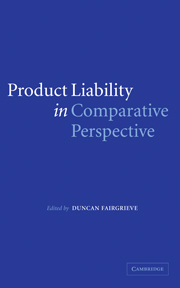Book contents
- Frontmatter
- Contents
- List of figures
- Foreword by Sir Michael Burton
- List of contributors
- Preface
- 1 Introduction
- PART I Country reports
- 2 The use of comparative law in A & Others v National Blood Authority
- 3 Spanish product liability today – adapting to the ‘new’ rules
- 4 Interaction between the European Directive on Product Liability and the former liability regime in Italy
- 5 L'Exception française? The French law of product liability
- 6 German product liability law: between European Directives, American Restatements and common sense
- 7 Dutch case law on the EU Product Liability Directive
- 8 Defect in English law – lessons for the harmonisation of European product liability
- PART II European influences
- PART III Comparing systems
- Appendix
- Index
5 - L'Exception française? The French law of product liability
from PART I - Country reports
Published online by Cambridge University Press: 28 July 2009
- Frontmatter
- Contents
- List of figures
- Foreword by Sir Michael Burton
- List of contributors
- Preface
- 1 Introduction
- PART I Country reports
- 2 The use of comparative law in A & Others v National Blood Authority
- 3 Spanish product liability today – adapting to the ‘new’ rules
- 4 Interaction between the European Directive on Product Liability and the former liability regime in Italy
- 5 L'Exception française? The French law of product liability
- 6 German product liability law: between European Directives, American Restatements and common sense
- 7 Dutch case law on the EU Product Liability Directive
- 8 Defect in English law – lessons for the harmonisation of European product liability
- PART II European influences
- PART III Comparing systems
- Appendix
- Index
Summary
Introduction
The preamble to the 1985 European Directive on Product Liability declares that harmonisation of national rules is necessary in view of the fact that disparities are liable to distort competition, to affect the free movement of goods and lead to differences in the level of protection offered to consumers against physical injury and damage to goods caused by a defective product.
The interaction between Community law and the national laws of the Member States has been a complex process. The purpose of this paper is to analyse the reception of this aspect of European law in one system, that of France.
The French law on product liability has traditionally adopted a pro-consumer approach, engineered mainly by the intervention of the courts. Professor John Bell has noted that the French law of product liability is essentially a creature of judicial and doctrinal interpretation of the Napoleonic Code. Professor Malinvaud has also described how the judiciary have been active in shaping the law:
Guided by the desire to compensate as fully as possible the victim, that is to say the consumer of the product, the case law has created a new positive law whilst respecting the texts, at least in appearance.
It will be shown in this chapter that following the chronic delay on the part of the French legislator to implement the European Directive, the French courts themselves acted, and moulded the case law in a way inspired by the themes underpinning the European provisions.
- Type
- Chapter
- Information
- Product Liability in Comparative Perspective , pp. 84 - 99Publisher: Cambridge University PressPrint publication year: 2005



